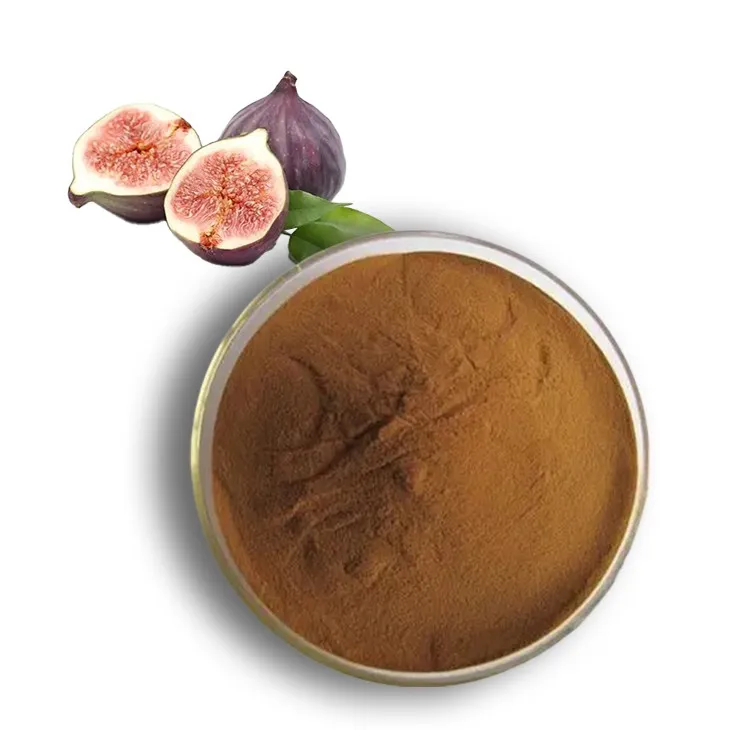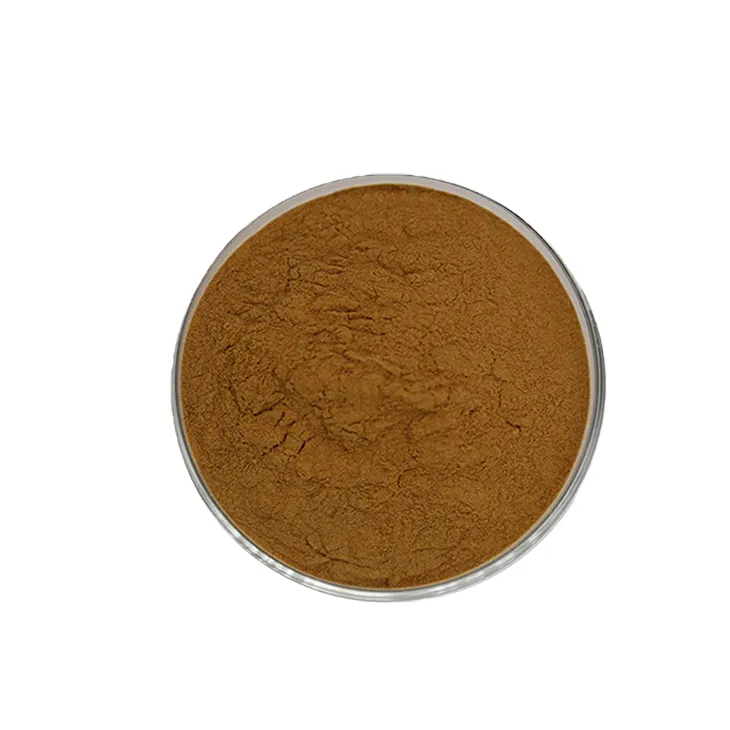- 0086-571-85302990
- sales@greenskybio.com
The Best Herbs for Treating Anxiety and Insomnia: Fig Extract
2024-11-12

Introduction
Anxiety and insomnia are two common and often intertwined health issues that can significantly impact an individual's quality of life. Anxiety is characterized by excessive worry, fear, and unease, which can lead to physical symptoms such as a racing heart, sweating, and shortness of breath. Insomnia, on the other hand, refers to difficulty falling asleep, staying asleep, or experiencing non - restorative sleep. In modern society, many people are seeking natural alternatives to pharmaceutical drugs to address these problems, and Fig Extract has emerged as a potentially effective option.

Fig Extract: An Overview
Fig trees (Ficus carica) have been cultivated for thousands of years, not only for their delicious fruits but also for their medicinal properties. Fig Extract is obtained from different parts of the fig tree, including the leaves, fruits, and bark. It contains a rich variety of bioactive compounds, such as flavonoids, phenolic acids, and alkaloids, which are believed to be responsible for its therapeutic effects.

How Fig Extract Treats Anxiety
1. Regulation of Brain Activity
One of the ways fig extract may combat anxiety is by regulating brain activity. The brain is a complex organ, and excessive neural excitation can lead to anxiety symptoms. Some of the compounds in fig extract have been shown to interact with neurotransmitter systems in the brain. For example, flavonoids may modulate the activity of gamma - aminobutyric acid (GABA), an inhibitory neurotransmitter. GABA helps to reduce the overall excitability of neurons, leading to a calmer state of mind. By enhancing GABAergic activity, fig extract can potentially reduce excessive brain activity associated with anxiety.
2. Anti - Inflammatory Effects
Chronic inflammation has been implicated in the development of anxiety disorders. Fig extract contains anti - inflammatory compounds that can help to reduce inflammation in the body, including the brain. Phenolic acids in fig extract have antioxidant and anti - inflammatory properties. By reducing inflammation, fig extract may help to improve the overall function of the nervous system and alleviate anxiety symptoms.
3. Stress Hormone Modulation
When a person is stressed or anxious, the body releases stress hormones such as cortisol. Elevated levels of cortisol over a long period can disrupt the body's normal physiological functions and contribute to anxiety. Fig extract may play a role in modulating the release of stress hormones. Alkaloids in the extract may interact with the hypothalamic - pituitary - adrenal (HPA) axis, which is responsible for regulating stress hormone secretion. By normalizing cortisol levels, fig extract can help to reduce anxiety.

How Fig Extract Treats Insomnia
1. Relaxation of the Nervous System
Similar to its effects on anxiety, fig extract can relax the nervous system, which is crucial for improving sleep. A relaxed nervous system is more conducive to falling asleep and staying asleep. The flavonoids and other bioactive compounds in fig extract can act on the central nervous system to reduce tension and promote a state of relaxation. This relaxation effect can help to shorten the time it takes to fall asleep, known as sleep latency.
2. Regulation of the Circadian Rhythm
The body's internal clock, or circadian rhythm, plays a vital role in sleep - wake cycles. Disruptions to this rhythm can lead to insomnia. Fig extract may have the ability to regulate the circadian rhythm. Some of its compounds can interact with the genes and proteins involved in the regulation of the circadian clock. By helping to reset the circadian rhythm, fig extract can improve the timing and quality of sleep, increasing the overall sleep duration.
3. Reduction of Sleep - Disrupting Factors
Insomnia can be caused by various factors, such as pain, inflammation, and hormonal imbalances. As mentioned earlier, fig extract has anti - inflammatory and hormone - modulating properties. By reducing inflammation and normalizing hormonal levels, it can eliminate some of the factors that disrupt sleep. Additionally, if anxiety is contributing to insomnia, the anxiolytic effects of fig extract can also indirectly improve sleep quality.
Research Findings on Fig Extract for Anxiety and Insomnia
Several scientific studies have been conducted to investigate the effects of fig extract on anxiety and insomnia. In animal studies, fig extract has shown promising results. For example, in a study on rats with induced anxiety - like behavior, treatment with fig extract led to a significant reduction in anxiety - related behaviors, such as increased exploration in an open - field test. In vitro studies have also demonstrated the neuroprotective and anxiolytic effects of the bioactive compounds in fig extract.
Regarding insomnia, some small - scale human trials have been carried out. Participants who took fig extract supplements reported improvements in sleep quality, including shorter sleep latencies and longer sleep durations. However, more large - scale, well - controlled clinical trials are needed to further confirm these findings and establish the optimal dosage and treatment duration.
Patient Experiences with Fig Extract
Many patients who have tried fig extract for anxiety and insomnia have reported positive experiences. Some have noted a reduction in their daily anxiety levels, allowing them to function better in their daily lives. For example, a patient who had been struggling with generalized anxiety disorder reported feeling more calm and centered after taking fig extract for a few weeks.
In terms of insomnia, patients have described easier falling asleep and staying asleep throughout the night. One patient who had suffered from chronic insomnia due to stress said that fig extract helped them to relax and get a full night's sleep without relying on sleeping pills.
However, it's important to note that individual responses may vary. Some patients may not experience significant improvements, and in rare cases, there may be side effects such as mild gastrointestinal discomfort.
Integrating Fig Extract into a Comprehensive Health Plan
1. Dietary Considerations
Fig extract can be incorporated into the diet in various ways. Fresh figs are a delicious and natural source of the extract. They can be eaten as a snack or added to salads, desserts, or smoothies. Dried figs are also available and can be consumed directly or used in cooking. Additionally, fig - based supplements are available in the market. When choosing supplements, it's important to look for high - quality products from reputable manufacturers.
2. Lifestyle Modifications
While fig extract can be beneficial, it should be part of a comprehensive health plan. Lifestyle modifications are crucial for treating anxiety and insomnia. Regular exercise has been shown to reduce anxiety and improve sleep quality. Incorporating activities such as walking, yoga, or swimming into daily routines can have a positive impact. Stress management techniques, such as meditation, deep breathing exercises, and relaxation techniques, are also essential. These practices can work in tandem with fig extract to enhance its effectiveness.
3. Complementary Therapies
Fig extract can also be combined with other complementary therapies for anxiety and insomnia. For example, aromatherapy using essential oils such as lavender has been shown to have relaxing effects. Using lavender essential oil in combination with fig extract may provide enhanced anxiolytic and sleep - promoting benefits. Herbal teas, such as chamomile tea, which also has mild sedative properties, can be drunk in addition to taking fig extract.
Conclusion
Fig extract shows great potential as a natural remedy for anxiety and insomnia. Its multiple mechanisms of action, including regulation of brain activity, anti - inflammatory effects, and modulation of stress hormones for anxiety, and relaxation of the nervous system, regulation of circadian rhythm, and reduction of sleep - disrupting factors for insomnia, make it an attractive option. While research findings and patient experiences are promising, more studies are needed to fully understand its efficacy and safety. By integrating fig extract into a comprehensive health plan that includes dietary changes, lifestyle modifications, and complementary therapies, individuals may be able to effectively manage their anxiety and insomnia and improve their overall quality of life.
FAQ:
What are the main natural compounds in fig extract that help with anxiety and insomnia?
Fig extract contains various natural compounds. Some of the potentially beneficial ones include flavonoids, phenolic acids, and polysaccharides. Flavonoids have antioxidant and anti - inflammatory properties which may contribute to reducing anxiety by modulating neurotransmitter levels in the brain. Phenolic acids may also play a role in calming the nervous system. Polysaccharides might help regulate the body's stress response, which in turn can be beneficial for both anxiety and insomnia.
How does fig extract reduce excessive brain activity related to anxiety?
Fig extract may reduce excessive brain activity through several mechanisms. It could interact with neurotransmitter systems in the brain, such as the GABAergic system. GABA is an inhibitory neurotransmitter that helps calm the brain. The compounds in fig extract might enhance the activity of GABA or increase its availability, thereby reducing the over - excitability of neurons associated with anxiety. Additionally, it may also have an impact on the regulation of stress hormones, which can influence brain activity.
Can fig extract be used as a sole treatment for anxiety and insomnia?
While fig extract shows promise in treating anxiety and insomnia, it is not typically recommended as a sole treatment. These conditions are often complex and can be caused by multiple factors such as lifestyle, diet, underlying medical conditions, and psychological factors. Fig extract can be a valuable part of a comprehensive treatment plan that may also include lifestyle modifications (such as regular exercise, stress management), psychological therapies (like cognitive - behavioral therapy), and in some cases, medical treatment if necessary. However, for mild cases of anxiety and insomnia, fig extract alone may provide some relief.
Are there any side effects associated with using fig extract for anxiety and insomnia?
Generally, fig extract is considered safe for most people when used appropriately. However, some individuals may experience mild side effects such as digestive discomfort, including bloating or diarrhea. This is more likely if a large amount of fig extract is consumed. Also, in rare cases, those with allergies to figs may have an allergic reaction. It is always advisable to start with a small dose when using fig extract for the first time and consult a healthcare provider if any adverse effects occur.
How should fig extract be incorporated into a daily routine for treating anxiety and insomnia?
Fig extract can be incorporated into the daily routine in different ways. It is available in various forms such as capsules, tinctures, or dried fig powder. If using capsules, follow the recommended dosage on the product label. For tinctures, it can be added to a small amount of water and consumed. Dried fig powder can be added to smoothies, oatmeal, or other foods. It is best to take it at a consistent time each day, preferably in the evening for those with insomnia, as it may help relax the body and prepare for sleep. However, it should be noted that individual responses may vary, so it may be necessary to adjust the method and dosage based on personal experience.
Related literature
- The Therapeutic Potential of Fig Extract in Neurological Disorders"
- "Natural Remedies for Anxiety and Insomnia: A Review of Fig Extract"
- "Fig Extract: Composition and Its Impact on Stress - Related Disorders"
- ▶ Hesperidin
- ▶ Citrus Bioflavonoids
- ▶ Plant Extract
- ▶ lycopene
- ▶ Diosmin
- ▶ Grape seed extract
- ▶ Sea buckthorn Juice Powder
- ▶ Fruit Juice Powder
- ▶ Hops Extract
- ▶ Artichoke Extract
- ▶ Mushroom extract
- ▶ Astaxanthin
- ▶ Green Tea Extract
- ▶ Curcumin
- ▶ Horse Chestnut Extract
- ▶ Other Product
- ▶ Boswellia Serrata Extract
- ▶ Resveratrol
- ▶ Marigold Extract
- ▶ Grape Leaf Extract
- ▶ New Product
- ▶ Aminolevulinic acid
- ▶ Cranberry Extract
- ▶ Red Yeast Rice
- ▶ Red Wine Extract
-
Yam Extract
2024-11-12
-
Beetroot juice Powder
2024-11-12
-
Hedyotis Diffusa Extract
2024-11-12
-
Chasteberry Extract
2024-11-12
-
White Peony Extract
2024-11-12
-
Okra Extract
2024-11-12
-
Citrus Aurantium Extract
2024-11-12
-
Propolis Extract Powder
2024-11-12
-
Longan Extract
2024-11-12
-
Yellow Pine Extract
2024-11-12





















